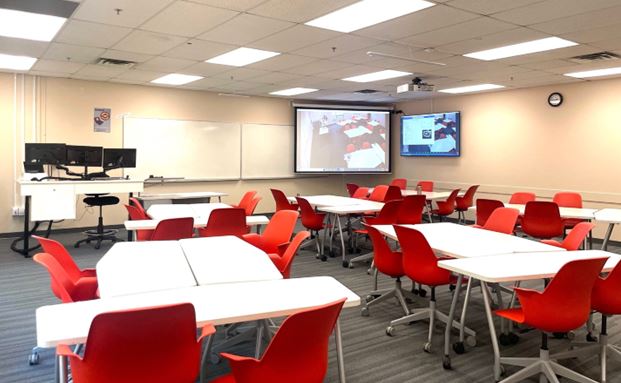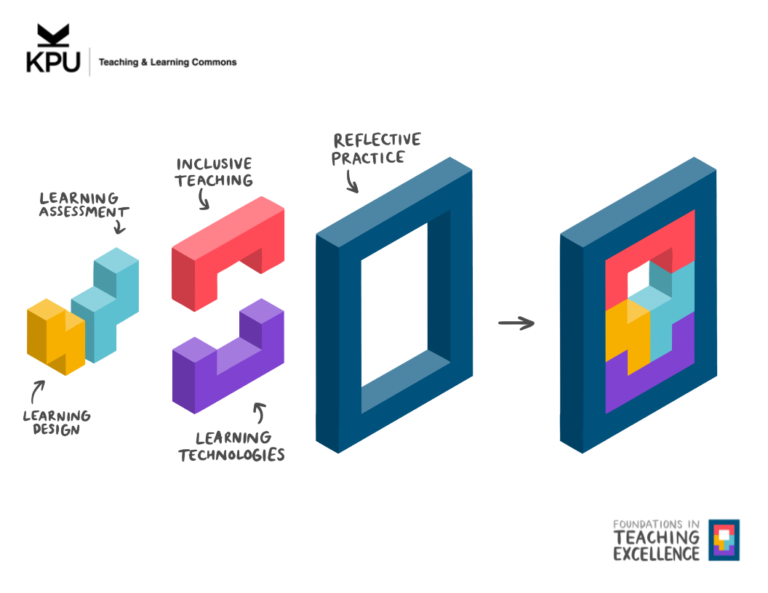Generative AI. or: How I Learned to Stop Worrying and Love the Bot

Generative AI (GenAI) is a thing! If you’ve read the news lately, it seems to be one of the only things we should be paying attention to, with headlines like:
“Cutting edge AI raises fears about risks to humanity”
“Artificial intelligence poses “risk of extinction,” tech execs and experts warn”
Clearly, the media thinks GenAI is an apocalyptic threat akin to the birth of Skynet or maybe “Clippy” has had a cyberpunk makeover for 2024.

Clippy is here to kick ass and temporarily join papers together. And he’s all out of paper!!
So, while we wait for the arrival of the T-800s, why don’t we explore some additional headlines around GenAI looking specifically at its expected impact on education. Like how a school board in Iowa is using GenAI to ban books.
“Iowa School District Uses AI to Ban Books”
I am going to say this again because I think it is important. A group of people responsible for the educational leadership of a school district are using one of the newest technologies to ban one of the oldest technologies. This is like a technological Matryoshka nesting doll of social impacts. It is both extremely progressive and extremely conservative at the same time!! You know Christopher Nolan is making a film about this.
While school boards aren’t adjusting well, many of the headlines addressing post-secondary aren’t much better.
“Academics worry over AI cheating”
“ChatGPT May Lead To The Downfall Of Education And Critical Thinking”
“AI anxiety: The Workers who fear losing their jobs to artificial intelligence”
Buried within the media’s use of apocalyptic language to keep a dying industry profitable for another quarter, there are some concerns around post-secondary education that keep coming up:



- Concerns around Academic Integrity
2. Concerns around Impact on Learner’s Ability
3. Concerns around instructors Being Replaced
While the abilities of this GenAI Technology are new, I am old enough that these concerns seem eerily similar. So, I thought I would explore previous technological advancement and the resulting concerns for education communicated by the media.
The term “technology” has come to conjure up thoughts of innovation with mechanical or electrical devices. This fits with the modern world, as most of our advancements have been in these areas; however, earlier definitions of technology speak to the application of knowledge to the practical aims of human life and the change and manipulation of the human environment. This more inclusive definition applies equally to the use of CRISPR in DNA modifications and the selection of Quartzite for hand tools in Olduvai Gorge. Both CRISPR and Quartzite hand tools are technology. Educational Technology is the application of any technology to facilitate learning and/or instruction. This includes anything from cuneiforms and clay tablets to GenAI.
Technology in general yields concerns. Postman critiqued the uncritical adoption of technology in education. He argued that technology often alters the nature of education and can lead to superficial learning rather than genuine understanding. Turkle argued that excessive use of technology in education can lead to a loss of empathy and genuine connection among students and teachers. Finally Howard Gardner, a psychologist known for his theory of multiple intelligences, expressed concerns about the impact of digital media on young minds. He argued that excessive use of digital technologies can hinder development of creativity and social skills.
Technology in general seems to be concerning for education. Is all technology concerning, or has there been specific technology that was not concerning?
SOCIAL MEDIA
(Social Media) “Negatively impact self-esteem and distracts from academic pursuits” Jesse Chinda – Drasco
“Social Media Usage Negatively Impacts the Schoolwork of Students from Adolescence to College Research Suggests” University of Deleware: NewsWise
It seems that social media raised concerns about negatively impacting the social and academic development and abilities of students. The second article quotes findings that “social media usage can have major interference with brain development.”
CELL PHONES
“The human brain is incapable of true multitasking and rapid switch-tasking doesn’t allow for deeper understanding of subjects.” Michael Rich, Associate Professor at Harvard Medical School
“Forget passing handwritten notes underneath desks or inking your arm with essential math formulas before a killer test. If students today want to cheat, they have a more insidious tool at their disposal: cellphones.” Zach Miners USA news
These articles outline how the use of cell phones both negatively impacts the learning of students while providing an opportunity to engage in academic honestly breaches. Cell Phones are bad for learners and learners will do bad things with them.
THE INTERNET
“The ease of access to information can lead to a lack of critical thinking skills as students may be more likely to accept information at face value without questioning its validity” Priyanka Ahuja, The impact of the internet on Education and Learning
“The Internet has arguably exacerbated this problem; the easy availability of information (accurate or otherwise) on websites has led many students to assume that all information sources are de facto public property and need not be cited, which leads to unintentional plagiarism.” Thomas Keith
The internet was seen to be a detriment to the critical thinking skills of the learner and leading to breaches in academic honesty in the form of unintended plagiarism.
COMPUTERS
“Laptop use lowers student Grades” The Canadian Press
The CBC ran a report on a study at McMaster that suggests that laptop use in class not only negatively impacts the laptop user’s grades, but has the potential to impact anyone in the class who can see the screen.
“With the rise of technology, academic cheating is becoming more and more prolific” The NYU Dispatch
In the second article, computers are not just an opportunity for academic dishonesty, but a catalyst for a cottage industry that buys, sells and write papers, “sells cheat aids and publishes how-to-cheat videos
CALCULATORS
“The calculator seems to evoke all sort of fears that the students’ computational abilities would be ruined” Audrey Watters
“There are concerns about the misuse of calculators for cheating during exams or assignments, especially if students are allowed to use programmable calculators that can store formulas or other information.” Collins, A., & Avolio, E. L. (1983)
There were concerns about how the use of calculators would damage learners’ computational abilities and, of course, concerns around the increased possibility of academic honesty breaches. I am old enough to remember when handheld calculators became inexpensive enough for the average student to own. First, my school banned them. Then calculators proliferated. Then came in wallet size, and on wrist watches and as an add on to everything with an LCD screen. Now they are required equipment for the North Vancouver School District.
BROADCAST, RADIO AND TELEVISION
There are a fair number of articles discussing the negative impacts of Broadcasts. They brought up concerns around things like standardization of information, wealth gap access and critical thinking. I thought this somewhat less nuanced comment summed the perspective up well.
“In 1950, Boston University’s President Dr. Daniel L. Marsh warned that “if the [television] craze continues with the present level of programs, we are destined to have a nation of morons.
While the above articles are pulled from more mainstream media, the academic journals expressed similar concerns.
It appears the specific technological innovations of the 20th and 21st century (so far) have all caused some concern. What is more interesting is the innovations that we currently consider obsolete also caused some significant concern.
CHALKBOARDS
There was a time before there were chalkboards, and their introduction as educational technology cause a riot at Yale University in 1830. The chalkboard created new challenges for instructors in adapting their practice to the new technology. The chalkboards also created new challenges for students who had to adapt to a new type of instruction and assessment modality. About half the student class was suspended as a result of chalkboards being introduced into their education.
UNIVERSITIES
The creation of universities led to relationships with host cities that could be quite adversarial. Some universities were under the control of the ruling king, other universities were under control of the pope, and still other universities were under control of the students. The resulting power struggle over the control of knowledge led to tensions between the populations of the cities and the universities; which occasionally spilled over into what became known as “town and gown” clashes. Paris is often cited as the site of the first “Town and Gown” clash in 1200. Oxford University experienced a 3-day riot in 1355 where the university halls were raided with scholars and approximately 30 towns folks losing their lives. Think the last Harry Potter movie with pitchforks and torches instead of wands. Think the last Harry Potter movie with pitchforks and torches instead of wands.
THE WRITTEN WORD
Plato describes, in his dialogue Phaedrus, Socrates, who expresses several concerns with the impact the use of written language could have on a learner. Socrates felt that writing could lead to forgetfulness as the learner would be able to write information down without committing it to memory. Relying on the written information would weaken a student’s memory and allow for the appearance of understanding, instead of true understanding. Working from written work would remove the possibility to engage in a dialogue which would impact the learners critical thinking ability.
“For this invention will produce forgetfulness in the minds of those who learn to use it, because they will not practice their memory. Their trust in writing, produced by external characters which are no part of themselves, will discourage the use of their own memory within them. You have invented an elixir not of memory, but of reminding; and you offer your pupils the appearance of wisdom, not true wisdom, for they will read many things without instruction and will therefore seem [275b] to know many things, when they are for the most part ignorant and hard to get along with, since they are not wise, but only appear wise.
Looking at this (admittedly selective) history it seems to me that it isn’t necessarily the technology that is the cause for concern, but the challenge of adapting to new technology is the cause for concern. This is understandable. A new tool is released that seems capable of almost anything. Many people have access to and no one knows how to use it well. We know it is going to impact our work, but we don’t know how, and it is just one more thing we have to learn about on top of everything else we are accountable for.
While this is true, it is also true that Generative AI is just a tool and like most tools, it can be used constructively or it can be used destructively. Learning to use it well will go a long way towards ameliorating the concerns around GenAI in post-secondary educations. In order to use any tool effectively and appropriately educators need to understand it. This means demystifying GenAI and moving beyond the hyperbole. GenAI’s capabilities, limitations, strengths, and weaknesses need to be explored. From here, educators can begin establishing what ethical and effective use of this tool looks like for their discipline. They can then begin to address their concerns.

1. Concerns around Academic Integrity
Informed educators can discuss Generative AI in the context of education and their discipline. A tool like the “Principles For The Effective Use of Generative AI
may be helpful here. Having this discussion allows the educator to contextualize the tool used to enhance learning, rather than shortcut it, and provide some insight into the learner’s thought processes around the tool. This increases communication, transparency, and context for both the educator and the learner. This can mitigate much of the incidental or accidental academic integrity breaches we see when the tool is banned without discussion.
Informed educators understand than GenAI will render educational and assessment activities, that focus on rote knowledge acquisition, meaningless. They also understand that every graduate who undertakes a career will be using GenAI in their daily lives. Informed educators will best support their learners by refocusing their educational activities on applications requiring human agency. Assessments will be authentic and instruction and assessments must also focus on the learner’s ability to use the GenAI in the context of the discipline. A tool like Kleiman’s Space Framework may be helpful here.

2. Concerns around Impact on Learner’s Ability

3. Concerns around Instructors Being Replaced
Some jobs will be lost to AI, however it is more accurate to say that all jobs have at least one task that AI can do better (Bowen & Watson, 2024). This is to say that AI may be able to write a first draft instantly, it is still not capable of doing what instructors do best; inspire, guide, and provide a human touch. Richard Baldwin famously said “AI won’t take your job, it’s somebody using AI that will take your job. Of course, this is not a concern for informed educators, as they know how to use GenAI effectively and appropriately.
GenAI Is a thing. It’s a really big thing that will impact each of us over time. It is worthy of consideration and concern, but not fear. It is just a tool – like calculators, cellphones, computers, or books. We need to educate our learners on its effective and ethical use. To do this, we, as educators, need to understand it, guide its use, and keep up with changes and advancements in GenAI. If we do this, we use this new tool well. If we don’t do this well, then we might just join that school district in Iowa and use it to ban book.
If you are interested in learning more about Generative AI, in addition to every television, radio, newspaper, and magazine questioning the future of humanity, the Teaching & Learning Commons have put together some more measured information on Generative AI <Available Here>, including the following opportunities
- Curated Learning Opportunities
This is a series of LinkedIn learning opportunities curated to meet the need of KPU Instructors <for more information>
- Syllabus Language: Suggested syllabus language for including or excluding the use of GenAI in a class. <for more information>
- Gen AI Community of Practice: Educators coming together as a community to learn about GenAI and explore effective practice and process. <for more information>
- Generative AI Workshop: Introductory workshop to explore GenAI, and its effective and ethical use for educational activities and assessments. <for more information>
- Generative AI Rubrics: Language and Examples for embracing and mitigating Generative AI in your Assessment Rubrics. Select link below and scroll to the bottom left of the page. <for more information>
This was written with Copilot Generative AI. All images were created in Copilot.
REFERENCES
https://www.cbc.ca/news/world/artificial-intelligence-extinction-risk-1.6859118
https://www.bbc.com/news/world-us-canada-64967627
https://www.procon.org/headlines/iowa-school-district-uses-ai-to-ban-books/
https://cxotoday.com/news-analysis/academics-worry-over-ai-cheating/#
The anxiety of being replaced by AI (bbc.com)
Neil Postman, in his book “Technopoly: The Surrender of Culture to Technology,”
Sherry Turkle, “Alone Together: Why We Expect More from Technology and Less from Each Other”
Howard Gardner “The App Generation: How Today’s Youth Navigate Identity, Intimacy, and Imagination in a Digital World.”
The Impact of Social Media on Education: Opportunities and Challenges The Effects of Social Media | Drasco Educational Services Blog
Experts see pros and cons to allowing cellphones in class — Harvard Gazette
One Third of Teens Use Cellphones to Cheat in School (usnews.com)
https://www.linkedin.com/pulse/impact-internet-education-learning-priyanka-ahuja
Thomas Keith – Academic Dishonesty – What causes it, How to prevent it. Psychology today Literature Review: Academic Dishonesty – What Causes It, How to Prevent It | Academic Technology Solutions (uchicago.edu)
Laptop use lowers student grades. CBC.ca https://www.cbc.ca/news/science/laptop-use-lowers-student-grades-experiment-shows-1.1401860
What impact is Technology having on Student Cheating? https://wp.nyu.edu/dispatch/2018/02/26/what-impact-is-technology-having-on-student-cheating/#:~:text=With%20the%20rise%20of%20technology,responses%20to%20how%20to%20replace
Collins, A., & Avolio, E. L. (1983). “The Use of Calculators in Mathematics Instruction.” The Arithmetic Teacher, 31(3), 44-48.
https://www.sd44.ca/school/carson/About/schoolpolicies/Documents/CALCULATOR%20POLICY.pdf
William R. Klemm – Television Effects on Education, Revisited. Psychology Today. https://www.psychologytoday.com/ca/blog/memory-medic/201207/television-effects-education-revisited
Best, L. M. & Shelley, D. J. (2018). Academic Dishonesty: Does Social Media Allow for Increased and More Sophisticated Levels of Student Cheating?. International Journal of Information and Communication Technology Education (IJICTE), 14(3), 1-14. http://doi.org/10.4018/IJICTE.2018070101
Chukwuere, J. E. and Ifeanyi, P. I. (2018). The impact of using smartphones on the academic performance of undergraduate students. Knowledge, Management and E-Learning, 10(3), 290-308. https://files.eric.ed.gov/fulltext/EJ1247625.pdf
de Guevara Rodríguez, M.L., Lopez-Agudo, L.A. & Marcenaro-Gutierrez, O.D. The impact of different uses of the Internet on students’ performance progression throughout primary education. Educ Inf Technol (2023). https://doi.org/10.1007/s10639-023-12354-8
Désiron, J.C., Petko, D. Academic dishonesty when doing homework: How digital technologies are put to bad use in secondary schools. Educ Inf Technol 28, 1251–1271 (2023). https://doi.org/10.1007/s10639-022-11225-y
Suydam, M. N. (1984). “Calculated Risks: Are Students Ready for Calculators?” Educational Leadership, 41(2), 52-54.
Buxton, B. (2008). “The Impact of Television on Education.” In J. Kerr (Ed.), The Encyclopedia of Educational Technology. http://eprints.rclis.org/9877/1/impact-of-tv.pdf
Anna Green The Yale Chalkboard rebellion of 1830. Mental Floss. https://www.mentalfloss.com/article/68749/yale-chalkboard-rebellion-1830
Gasper, G. (2016) The medieval power struggles that helped forge today’s universities, The Conversation. https://theconversation.com/the-medieval-power-struggles-that-helped-forge-todays-universities-54298
BROCKLISS, L. (2000). GOWN AND TOWN: THE UNIVERSITY AND THE CITY IN EUROPE, 1200-2000. Minerva, 38(2), 147–170. http://www.jstor.org/stable/41821160
Plato’s dialogue (circa 370 BCE) Phadrus. 14, 274c-275b
https://medium.com/the-generator/teaching-students-to-write-with-ai-the-space-framework-f10003ec48bc
https://www.businessinsider.com/ai-wont-take-your-job-someone-who-uses-it-might-2023-5
Craig Wright
Craig’s role at KPU is to support instructors with defining and delivering meaningful learning opportunities for their students. He works with instructors to clarify instructional goals and intention and effectively apply, as needed, theory, practice, and technology, to deliberately meet specific instructional goals. Craig endeavors to meet people where they are. The support he provides and tactics he uses are tailored to the instructor’s context and need from holistic program development and revision to assignment support.





